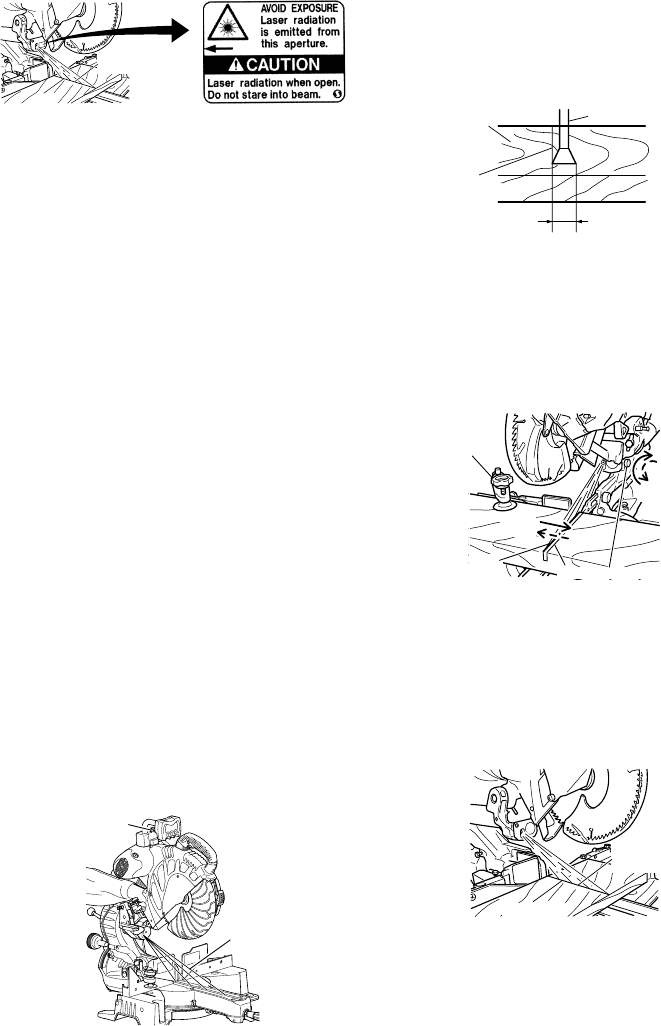
11
Fig. 19
* Laser radiation- Do not stare into beam.
* Laser radiation on work table. Do not stare into beam.
If your eye is exposed directly to the laser beam, it
can be hurt.
* Do not dismantle it.
* Do not give strong impact to the laser marker (main
body of tool); otherwise, the position of a laser line
can go out of order, resulting in the damage of the
laser marker as well as a shortened service life.
* Keep the laser marker lit only during a cutting
operation. Prolonged lighting of the laser marker can
result in a shortened service life.
* Use of controls or adjustments or performance of
procedures other than those specified herein may
result in hazardous radiation exposure.
NOTE
* Perform cutting by overlapping the ink line with the
laser line.
* When the ink line and the laser line are overlapped,
the strength and weakness of light will change,
resulting in a stable cutting operation because you
can easily discern the conformity of lines. This ensures
the minimum cutting errors.
* In outdoor or near-the-window operations, it may
become difficult to observe the laser line due to the
sunlight. Under such circumstances, move to a place
that is not directly under the sunlight and engage in
the operation.
* Do not tug on the cord behind the motor head or hook
your finger, wood and the like around it; otherwise,
the cord may come off and the laser marker may not
be lit up.
Ink lining can be easily made on this tool to the laser
marker. A switch lights up the laser marker. (Fig. 20)
Depending upon your cutting choice, the laser line
can be aligned with the left side of the cutting width
(saw blade) or the ink line on the right side.
The laser line is adjusted to the width of the saw blade
at the time of factory shipment. Adjust the positions
of the saw blade and the laser line taking the following
steps to suit the use of your choice.
Fig. 20
(1) Light up the laser marker and make a groove of about
5 mm deep on the workpiece that is about 20 mm in
height and 150 mm in width. Hold the grooved
workpiece by vise as it is and do not move it. For
grooving work, refer to “13.Groove cutting
procedures” on page 19.
Fig. 21
(2) Then, turn the adjuster and shift the laser line. (If you
turn the adjuster clockwise, the laser line will shift to
the right and if you turn it counterclockwise, the laser
line will shift to the left.) When you work with the ink
line aligned with the left side of the saw blade, align
the laser line with the left end of the groove. (Fig. 22)
When you align it with the right side of the saw blade,
align the laser line with the right side of the groove.
Fig. 22
(3) After adjusting the position of the laser line, draw a
right-angle ink line on the workpiece and align the
ink line with the laser line. When aligning the ink line,
slide the workpiece little by little and secure it by vise
at a position where the laser line overlaps with the
ink line. Work on the grooving again and check the
position of the laser line. If you wish to change the
laser line's position, make adjustments again
following the steps from (1) to (3).
Fig. 23
Switch
Laser line
Saw blade
Marking
(pre-marked)
Workpiece
Cutting width
Vise assembly
Turn
Move
Laser line
Groove
Adjuster
Marking
(pre-marked)
Laser line
03Eng_C12LSH_Eng 4/26/07, 5:32 PM11


















